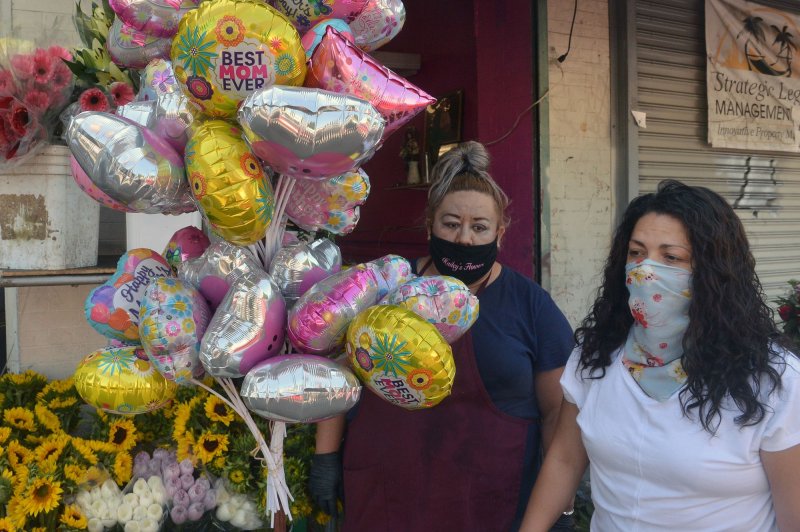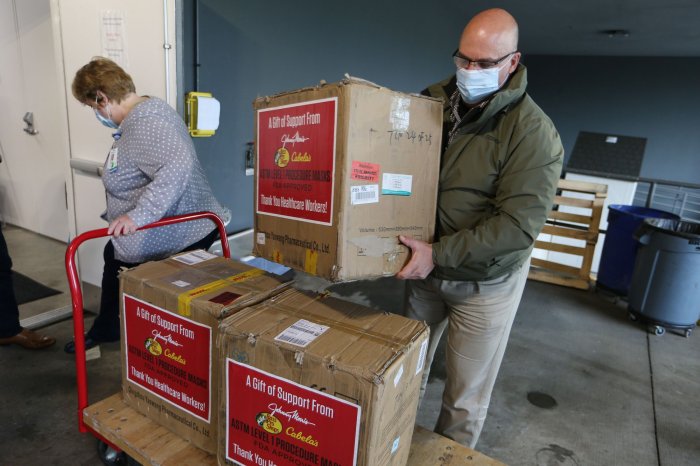Shoppers wear masks at a mall in downtown Los Angeles where the food court and some other businesses were open on May 8. Photo by Jim Ruymen/UPI |
License Photo
May 20 (UPI) -- Connecticut on Wednesday became the final U.S. state to loosen its coronavirus pandemic-related restrictions as retail businesses were allowed to reopen for the first time in nearly two months.
In the first stage of a four-phase reopening plan issued by Gov. Ned Lamont, retail stores and malls were allowed to admit shoppers under a set of COVID-19 guidelines, such as limiting occupancy to 50 percent and the mandatory wearing of masks at check-out counters.
Indoor food courts, however, must remain closed and restaurants must sell food for take-out only.
Outdoor recreation activities such as hiking and mountain biking can also resume in Connecticut starting Wednesday.
The reopening came as the state recorded more than 300 new COVID-19 infections and 23 additional deaths on Tuesday. More than 900 patients remained hospitalized.
Across the United States, the number of confirmed cases surpassed 1.5 million as the death toll rose to more than 92,000 as of midday Wednesday. New daily cases have averaged around 20,000 this week.
Retail businesses were also allowed to reopen Wednesday in Kentucky under Gov. Andy Beshear's "Healthy at Work" plan.
There, retailers must limit capacity to 33 percent capacity and, as in Connecticut, employees must wear face coverings while near other employees or customers. Store owners have been urged to install floor decals in cashier areas to establish safe distancing.
Restaurants are scheduled to open Friday in Kentucky.
"This is going to be a lot of additional activity," Beshear said Tuesday in his daily update, "and we've got to make sure that we do it safely. But I trust in you. We have been so good so far. But we have to do it differently. If we go about it as before, we'll have to re-pause our economy."
In the U.S. epicenter of New York, Gov, Andrew Cuomo reported 112 additional deaths from COVID-19 while the number of hospitalizations fell below 300 for the first time since the outbreak peaked in early April.
Cuomo focused attention during his daily briefing Wednesday on how the pandemic is affecting the state's low-Income and minority communities, citing results from statewide antibody testing showing those populations are still being hit hard by the coronavirus.
"The data shows not just a high positive, not just that a high number of people had the positive, but the spread is continuing in those communities and that's where the new cases are coming from," he said.
In response, Cuomo said, "today we're expanding our faith-based testing program ... to 72 locations in hardest-hit communities. We will also expand testing to 40 public housing developments."
In New York City, Mayor Bill de Blasio reiterated his pledge that the Macy's Fourth of July fireworks event will go on this summer despite the continuing strict social distancing measures in the city.
But, he warned, "do not assume it will look like what we've done in the past."
"It will involve fireworks, it will involve Macy's and that's all we know," the mayor said. "We are not going to let our nation's birthday go unrecognized. But whatever we do is about going to be about safety first."
Bass Pro Shops marketing manager David Smith (R) carries a box of donated face masks into Mercy Health in Chesterfield, Mo., on May 13. The company is donating 1 million FDA-approved ASTM Level 1 Procedure Face Masks to healthcare workers and first responders working on the front lines of the pandemic. Photo by Bill Greenblatt/UPI |
License Photo
















